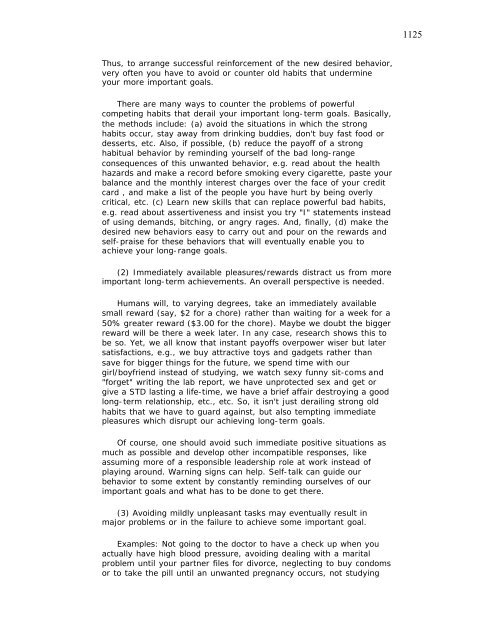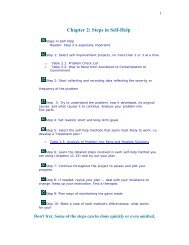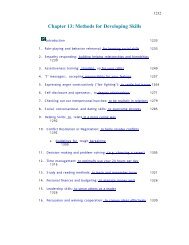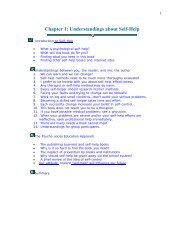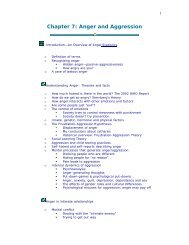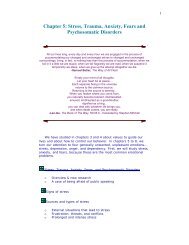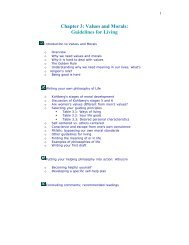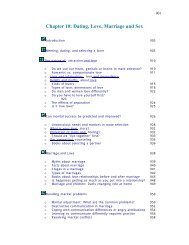Methods for Changing Behaviors - Psychological Self-Help
Methods for Changing Behaviors - Psychological Self-Help
Methods for Changing Behaviors - Psychological Self-Help
Create successful ePaper yourself
Turn your PDF publications into a flip-book with our unique Google optimized e-Paper software.
Thus, to arrange successful rein<strong>for</strong>cement of the new desired behavior,<br />
very often you have to avoid or counter old habits that undermine<br />
your more important goals.<br />
There are many ways to counter the problems of powerful<br />
competing habits that derail your important long-term goals. Basically,<br />
the methods include: (a) avoid the situations in which the strong<br />
habits occur, stay away from drinking buddies, don't buy fast food or<br />
desserts, etc. Also, if possible, (b) reduce the payoff of a strong<br />
habitual behavior by reminding yourself of the bad long-range<br />
consequences of this unwanted behavior, e.g. read about the health<br />
hazards and make a record be<strong>for</strong>e smoking every cigarette, paste your<br />
balance and the monthly interest charges over the face of your credit<br />
card , and make a list of the people you have hurt by being overly<br />
critical, etc. (c) Learn new skills that can replace powerful bad habits,<br />
e.g. read about assertiveness and insist you try "I" statements instead<br />
of using demands, bitching, or angry rages. And, finally, (d) make the<br />
desired new behaviors easy to carry out and pour on the rewards and<br />
self-praise <strong>for</strong> these behaviors that will eventually enable you to<br />
achieve your long-range goals.<br />
(2) Immediately available pleasures/rewards distract us from more<br />
important long-term achievements. An overall perspective is needed.<br />
Humans will, to varying degrees, take an immediately available<br />
small reward (say, $2 <strong>for</strong> a chore) rather than waiting <strong>for</strong> a week <strong>for</strong> a<br />
50% greater reward ($3.00 <strong>for</strong> the chore). Maybe we doubt the bigger<br />
reward will be there a week later. In any case, research shows this to<br />
be so. Yet, we all know that instant payoffs overpower wiser but later<br />
satisfactions, e.g., we buy attractive toys and gadgets rather than<br />
save <strong>for</strong> bigger things <strong>for</strong> the future, we spend time with our<br />
girl/boyfriend instead of studying, we watch sexy funny sit-coms and<br />
"<strong>for</strong>get" writing the lab report, we have unprotected sex and get or<br />
give a STD lasting a life-time, we have a brief affair destroying a good<br />
long-term relationship, etc., etc. So, it isn't just derailing strong old<br />
habits that we have to guard against, but also tempting immediate<br />
pleasures which disrupt our achieving long-term goals.<br />
Of course, one should avoid such immediate positive situations as<br />
much as possible and develop other incompatible responses, like<br />
assuming more of a responsible leadership role at work instead of<br />
playing around. Warning signs can help. <strong>Self</strong>-talk can guide our<br />
behavior to some extent by constantly reminding ourselves of our<br />
important goals and what has to be done to get there.<br />
(3) Avoiding mildly unpleasant tasks may eventually result in<br />
major problems or in the failure to achieve some important goal.<br />
Examples: Not going to the doctor to have a check up when you<br />
actually have high blood pressure, avoiding dealing with a marital<br />
problem until your partner files <strong>for</strong> divorce, neglecting to buy condoms<br />
or to take the pill until an unwanted pregnancy occurs, not studying<br />
1125


